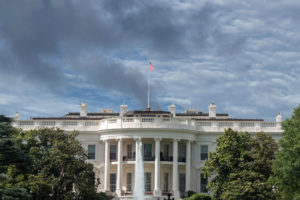Are LGTBQ Rights Trump’s Next Target?

During his first weeks in office, President Trump signed several executive orders for an Environmental Protection Agency media blackout, a ban on funding global organizations that either perform or mention abortion, and the now-infamous “Muslim ban.” Several in the LGBTQ community are worried that their rights are next on the list, especially after an anonymous White House official told the news site New Civil Rights Movement that Trump would overturn Obama’s 2014 anti-discrimination protections.
Last week, however, the White House released a statement assuring the public that Trump will keep Obama’s non-discrimination order intact. According to the statement:
President Donald J. Trump is determined to protect the rights of all Americans, including the LGBTQ community. President Trump continues to be respectful and supportive of LGBTQ rights, just as he was throughout the election. The President is proud to have been the first ever GOP nominee to mention the LGBTQ community in his nomination acceptance speech, pledging then to protect the community from violence and oppression.
While this may give some a sense of relief, it doesn’t negate the fact that the First Amendment Defense Act (FADA) is still on the table.
Introduced to the House of Representatives in 2015, the FADA— also known as HR 2802—forbids the government “from taking discriminatory action against a person on the basis that such person believes or acts in accordance with a religious belief or moral conviction that: (1) marriage is or should be recognized as the union of one man and one woman, or (2) sexual relations are properly reserved to such a marriage.” The bill further includes “corporations and other entities regardless of for-profit or nonprofit status” in their definition of a “person.”
While the conservative blog Daily Signal says the FADA won’t affect LGBTQ rights, the Human Rights Campaign says the bill will “allow individuals and businesses using taxpayer dollars to ignore the few federal policies that do exist to protect them if they claim the protections aren’t in line with their individual beliefs about marriage.” Jennifer Pizer of Lambda Legal echoed the HRC’s concerns as she told NBC back in December, “This proposed new law violates both Equal Protection and the Establishment Clause by elevating one set of religious beliefs above all others, and by targeting LGBT Americans as a group, contrary to settled constitutional law.”
Indeed, the bill’s language makes room for allowing businesses, employers, and organizations to use personal religious beliefs to discriminate against LGBTQ people. For starters, by including both for-profit and non-profit organizations in its definition of “person,” the bill could lead to another Hobby Lobby case where a company would be able to refuse either benefits or employment to LGBTQ individuals based on religious convictions.
Trump’s own views on LGBTQ rights are hard to define. Shortly after the election, he told 60 Minutes that the Supreme Court’s marriage equality decision was a “settled” and “done” deal. However, earlier last year he told Fox News Sunday he thought marriage equality should be up to individual states to decide, and that he would “strongly consider” appointing Supreme Court justices to overturn the decision. Likewise, when it comes to so-called bathroom bills, Trump initially said he had no qualms about whatever bathrooms transgender people use, but then voiced his support of North Carolina’s infamous HB 2 a few months later.
In regards to FADA, Trump has continually promised to sign the bill if congress approves it, and Attorney General nominee Jeff Sessions recently voiced his support as well. As he told Sen. Al Franken (D-MN):
[T]he purpose of the legislation was to prohibit the federal government from taking discriminatory actions against any person based on their belief or action in accordance with a religious or moral conviction. I supported this legislation because I believe that we can, and should, protect the rights of all citizens— including LGBT individuals and those with traditional views of marriage. I do not see freedom as a zero-sum game. I understand the critical and historic role of Department of Justice in upholding our nation’s civil rights laws. If I am fortunate enough to be confirmed as Attorney General, I will enforce those laws to the letter.
Of course Trump could possibly skip the FADA and go straight to an executive order.
Just a day after the White House’s press release, The Nation and the affiliated Investigative Fund obtained a copy of a four-page draft executive order that “seeks to create wholesale exemptions for people and organizations who claim religious or moral objections to same-sex marriage, premarital sex, abortion, and trans identity, and it seeks to curtail women’s access to contraception and abortion through the Affordable Care Act.” Although White House officials say it’s only one of a hundred executive order drafts in circulation, and it may not ever see Trump’s pen, it’s enough to suggest that Trump may skip the FADA deliberations in Congress altogether.
Despite the most recent White House press release, LGBTQ rights are still at risk under President Trump. While he may claim to support Obama’s 2014 anti-discrimination initiative, his vocal support for the FADA and the leaked executive order draft suggest he will leave enough room for loopholes. Also, despite his history of flip-flopping, his first few weeks in office show he will go through great lengths to keep his campaign promises.
